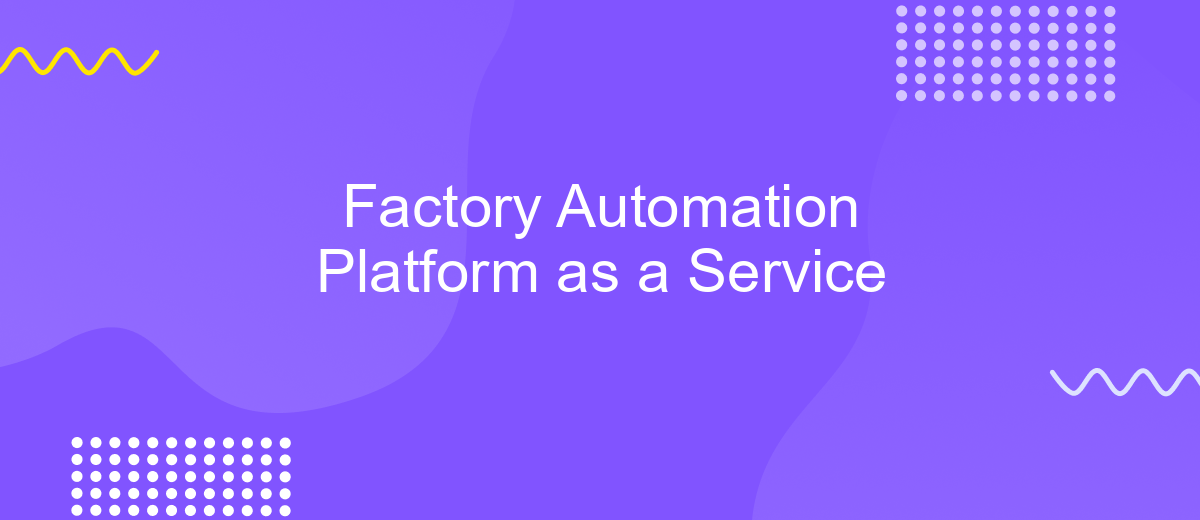Factory Automation Platform as a Service
Factory Automation Platform as a Service (FA PaaS) is revolutionizing the manufacturing industry by providing scalable, cloud-based solutions that enhance efficiency and productivity. By integrating advanced technologies such as IoT, AI, and machine learning, FA PaaS enables seamless automation and real-time data analysis. This empowers manufacturers to optimize operations, reduce costs, and adapt swiftly to market demands, ultimately driving innovation and competitiveness in the industrial sector.
Introduction to Factory Automation Platform as a Service (FAPS)
Factory Automation Platform as a Service (FAPS) represents a transformative approach to industrial automation, providing manufacturers with a cloud-based solution to streamline operations and enhance productivity. By integrating various automation tools and technologies into a cohesive platform, FAPS enables real-time monitoring, control, and optimization of manufacturing processes. This innovative service model offers scalability and flexibility, allowing businesses to adapt quickly to changing market demands and technological advancements.
- Cost Efficiency: Reduces upfront investment in hardware and software.
- Scalability: Easily scales operations to meet production needs.
- Real-Time Analytics: Provides insights for informed decision-making.
- Remote Accessibility: Enables control and monitoring from anywhere.
- Integration: Seamlessly integrates with existing systems and equipment.
As industries face increasing pressure to improve efficiency and reduce costs, FAPS emerges as a crucial enabler of smart manufacturing. It not only facilitates the adoption of Industry 4.0 principles but also empowers companies to remain competitive in a rapidly evolving landscape. By leveraging the power of the cloud, FAPS offers a strategic advantage, fostering innovation and operational excellence in the manufacturing sector.
Benefits of FAPS for Smart Manufacturing

Factory Automation Platform as a Service (FAPS) offers numerous benefits for smart manufacturing, primarily through enhanced efficiency and flexibility. By utilizing cloud-based solutions, manufacturers can streamline operations and reduce the need for extensive on-site infrastructure. This flexibility allows for rapid scaling of production capabilities in response to market demands. Additionally, FAPS facilitates real-time monitoring and data analysis, enabling manufacturers to make informed decisions quickly, optimize processes, and reduce downtime. This results in increased productivity and cost savings, which are critical in maintaining a competitive edge in the industry.
Another significant advantage of FAPS is its ability to integrate seamlessly with existing systems through services like ApiX-Drive. This integration capability ensures that manufacturers can connect various software and hardware components without extensive modifications or disruptions. ApiX-Drive, for instance, simplifies the integration process, allowing for the smooth exchange of data between different platforms. This interconnectedness supports the creation of a more cohesive and responsive manufacturing environment, where automation and human oversight work in tandem to maximize output and quality. Overall, FAPS empowers smart manufacturing by providing the tools needed to adapt and thrive in a rapidly evolving technological landscape.
Key Components of FAPS

Factory Automation Platform as a Service (FAPS) is revolutionizing industrial processes by integrating advanced technologies to streamline operations. At its core, FAPS leverages cloud-based solutions to enhance efficiency, flexibility, and scalability in manufacturing environments. By utilizing FAPS, businesses can achieve seamless integration of various automation components, resulting in optimized production workflows.
- Cloud Infrastructure: Provides scalable computing resources, enabling real-time data processing and storage.
- IoT Connectivity: Facilitates communication between devices and systems, ensuring synchronized operations.
- Data Analytics: Utilizes machine learning algorithms to analyze production data for predictive maintenance and process optimization.
- Security Protocols: Ensures data integrity and protection against cyber threats through robust security measures.
- Integration Tools: Offers APIs and middleware to connect legacy systems with modern automation technologies.
By incorporating these key components, FAPS empowers manufacturers to transition towards smart factories. This transformation not only enhances productivity but also reduces operational costs and downtime. As industries continue to evolve, FAPS stands as a pivotal solution for achieving competitive advantage in the era of Industry 4.0.
Applications and Use Cases of FAPS

Factory Automation Platform as a Service (FAPS) revolutionizes manufacturing by providing scalable, flexible solutions for diverse industries. It enables seamless integration of advanced technologies like IoT, AI, and robotics, fostering efficient and adaptive production environments. By leveraging cloud-based platforms, manufacturers can optimize operations, reduce costs, and enhance productivity.
FAPS finds applications across various sectors, including automotive, electronics, pharmaceuticals, and consumer goods. It supports real-time data analytics and predictive maintenance, minimizing downtime and improving overall equipment effectiveness. Additionally, FAPS facilitates rapid prototyping and agile manufacturing, allowing companies to swiftly respond to market changes and customer demands.
- Smart manufacturing with IoT-enabled devices for enhanced connectivity.
- AI-driven quality control for defect detection and process improvement.
- Robotic process automation for repetitive task efficiency.
- Supply chain optimization through real-time data sharing.
By adopting FAPS, companies can achieve greater operational transparency and agility. This approach not only streamlines manufacturing processes but also supports sustainable practices by reducing waste and energy consumption. As industries continue to evolve, FAPS will play a critical role in shaping the future of smart factories.


Future Trends and Outlook for FAPS
As the landscape of manufacturing continues to evolve, Factory Automation Platform as a Service (FAPS) is poised to become increasingly integral to industrial operations. Emerging trends indicate a shift towards more flexible and scalable automation solutions, driven by advancements in artificial intelligence and machine learning. These technologies enable predictive maintenance and real-time analytics, allowing manufacturers to optimize production processes and reduce downtime. The integration of Internet of Things (IoT) devices further enhances connectivity and data collection, providing a comprehensive overview of factory operations.
Looking ahead, the demand for seamless integration solutions will grow, with platforms like ApiX-Drive playing a crucial role. ApiX-Drive facilitates the integration of various software and systems, enabling manufacturers to streamline operations and enhance productivity. As industries strive for greater efficiency, the adoption of cloud-based FAPS solutions will likely accelerate, offering cost-effective and scalable options. Additionally, the focus on sustainability will drive innovations in energy-efficient automation technologies, aligning with global environmental goals. The future of FAPS is bright, with technology continuing to transform the manufacturing sector.
FAQ
What is Factory Automation Platform as a Service (FAPaaS)?
How does FAPaaS improve manufacturing efficiency?
What types of integrations are possible with FAPaaS?
Is FAPaaS suitable for small and medium-sized enterprises (SMEs)?
How secure is Factory Automation Platform as a Service?
Routine tasks take a lot of time from employees? Do they burn out, do not have enough working day for the main duties and important things? Do you understand that the only way out of this situation in modern realities is automation? Try Apix-Drive for free and make sure that the online connector in 5 minutes of setting up integration will remove a significant part of the routine from your life and free up time for you and your employees.

